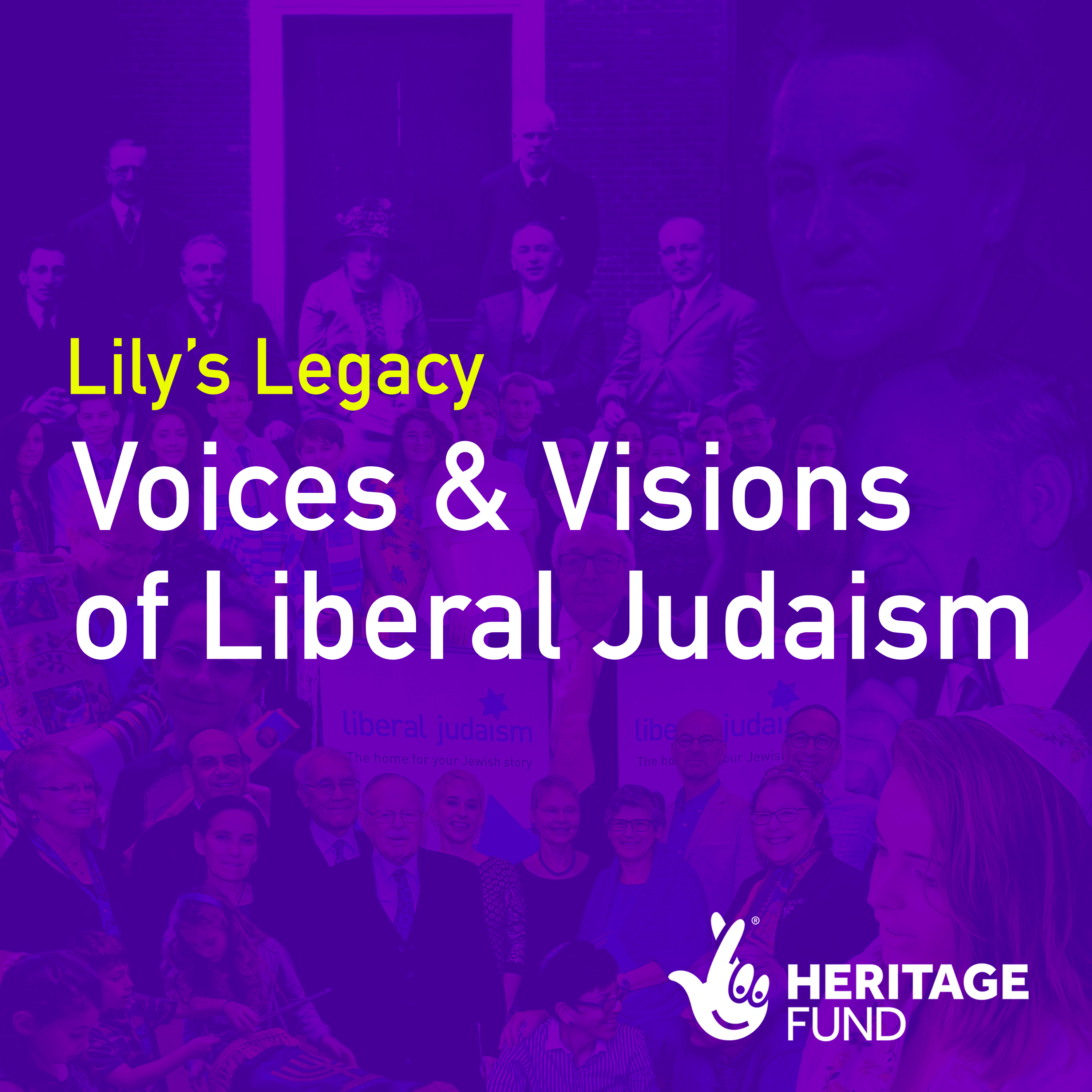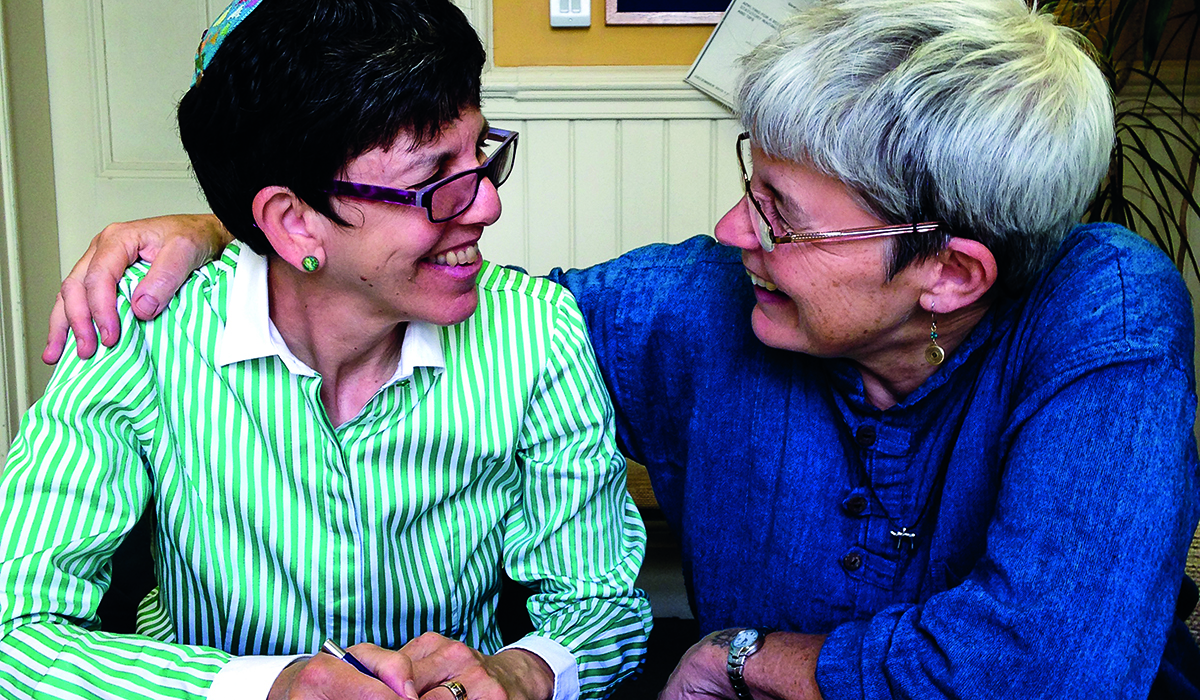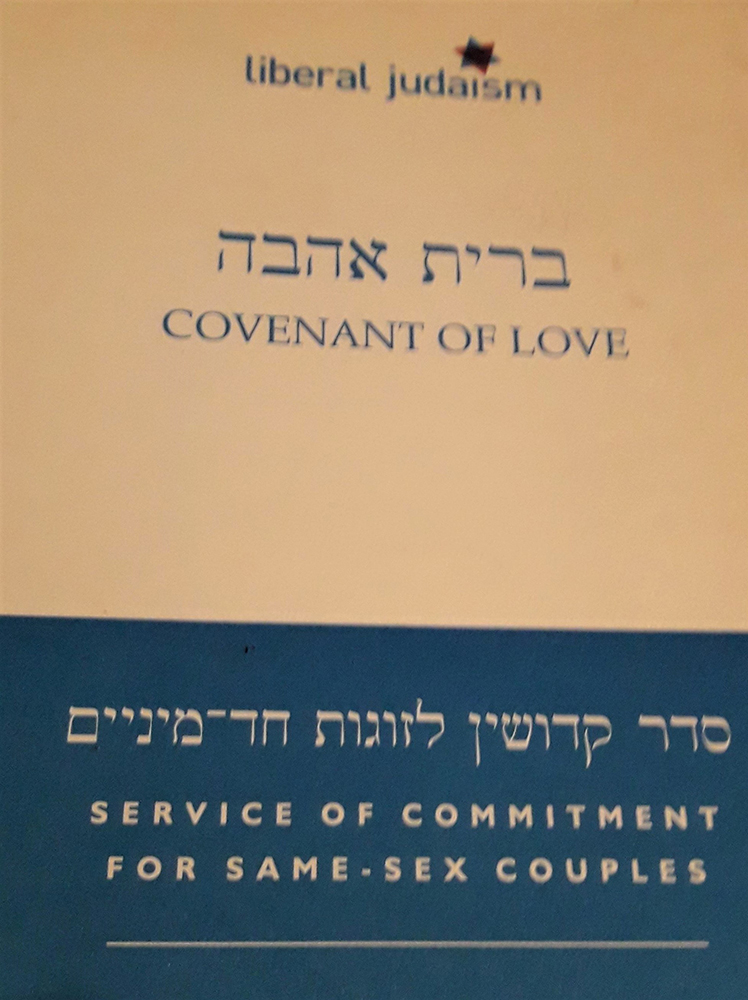Introduction/ Narrated by Harry Hurst
A podcast series compiled from oral histories and produced as part of a digital exhibition exploring how Liberal Judaism has evolved since it was co-founded by British visionary Lily Montagu in 1902.
This episode explores the theme of equality diversity and inclusion.
Equality and inclusion are key values for Liberal Jews. Liberal Judaism welcomes all Jews, regardless of marital status, sexual orientation, gender identity or disability. In this episode Liberal Jews from all walks of life share their stories about acceptance.
You will hear that some people feel that their needs have been accommodated, whilst others feel these are yet to be addressed. Although these voices record diverse experiences, the overwhelming message is that Liberal Judaism offers a place of belonging and acceptance – where everyone is welcome.
Inclusivity and equality are central to Liberal Jewish values. In the affirmations of Liberal Judaism it is stated that Liberal Jews affirm the need for an inclusive attitude to Jewish identity. We welcome into our congregations all who have a good claim to be regarded as Jewish, regardless of marital status or sexual orientation. In October 2012 Rainbow Jews pioneered a project to record and showcase Jewish lesbian, gay, bisexual and transgender (LGBT) history from the 1950s to today. The project captured the voices and experiences of Jewish LGBT people in the UK through oral histories and archive creation. However, whilst inclusivity is championed by Liberal Jews today, some participants recall times when acceptance was not easy, particularly within the rabbinate. Some congregants recall long journeys is their search for a Jewish home that did not compromise other aspects of their identity. Diversity is not only about sexual orientation, it is also about disability and any other way in which people feel they are different. Although the following voices record diverse experiences, the overwhelming message is that liberal Judaism offers a place of belonging and acceptance where everyone is welcome.
“We get Rabbi Danny Rich visits our Wessex Liberal community at least once a year and he will challenge us about the way that we are inclusive and there’s a delight in the fact that we have as liberal Judaism, both nationally influenced politics in order for gay people to have marriage on an equal footing. That in our local lives, that we consider the needs of perhaps elderly or disabled people within our own communities. That we we think about how our structures are set up to exclude or include people and how we make that a reality for people. We also have some Kindertransport, people still alive in our community. So refugees these days are possibly Syrian refugees and we have them to come into our house. Liberal Judaism has, publicised what we’ve been trying to do and several people from different communities and outside the Jewish community, totally Christian communities have been involved in getting together,“
Gillian Dawson
“The speaking I did after I read from the Torah about my thoughts about what I just read and everything I kind of based around stumbling stones topic and linked stuff together. So one of the lines in my portion was “You shall not place a stumbling block for the blind”, which I thought was really interesting. So I talked about that and how I thought society kind of makes people disabled. Or not makes people disabled obviously, but in a kind of metaphorical way, if someone in a wheelchair is in a building, and they need to get to the fifth floor, there’s no lift then they’re disabled, but if there is a lift then they are enabled, so it’s stuff like that. I think.”
Ruby Davis
“My identity as a gay man, as an autistic man, contributes to me finding it difficult to fit in to groups. And that includes religious groups and that includes Liberal Judaism. I think that’s the best way I can answer. Maybe I need to tell my story. Maybe I need to speak to people. Maybe I need to say to people, if – I believe that Liberal Judaism is inclusive. As that is the case,– I hope and I think there would be people within the structure, within the organisation who would be interested to hear what I have to say. Because, you know, I think, whilst I did gain a lot from the biennial, it would be different from going to a conference that is specifically geared towards people with autism. And there are all sorts of things that are taken into consideration. For example, , I’ve just had emails from the organisation saying there is some building work going on. And it could be a problem with noise, and if you’re – you know, for certain people –if you want to change your mind from coming, that’s okay. And all those sort of things are important. Whereas for most people, that wouldn’t – they wouldn’t even think about that. So, you know, I think Liberal Judaism – it would be great if they heard what I had to say and what it’s like to live as an autistic man. Because they’ve heard what it’s like to live as a gay person or a transsexual person.”
Michael
“
I find homophobia as nauseating as I find anti-Semitism, I really have a problem with homophobia. And there’s a lot of it about even here in Loudwater today, which really upsets me. When in the 70s, there was a lady Rabbi came, and she was interviewed by our sort of Council. And I thought she had all the qualifications we needed and we liked her. And we recommended her and then we were told, yes, she is good. But what we also have to consider is, would our community which is getting older, that the average age is probably in the 60s, would they be happy with a lesbian rabbi.
….. And I found that really, really regretful because I thought she was excellent. She had all the qualifications. So she was a lesbian. So what? perhaps there was another reason in fairness to that, because we took on later, the Hillel, who was gay, and he was one of the most popular rabbis, assistant rabbis we’ve had so either thing has changed in the intervening years between the other Rabbi and Hillel, or there was another reason why she was rejected rather than because she was lesbian. Who knows – I don’t know.
”
Peter Phillips
“Well, my Liberal Jewish story didn’t start very well. It then improved vastly because I was assigned to three places to Leicester Progressive Jewish congregation once a month, and then alternate Fridays between South Bucks and Northwood and Pinner. The rabbi at Northwood and Pinner would be able to keep his eye on me. And the person speaking to me would be able to keep his eye on me because he was the foster Rabbi at Leicester. What could not be planned was that when I arrived in Leicester, and the very first time I arrived to have a meeting to talk about the High Holy Days I was picked up by a wonderful person, Rene Chapman. And she took one look at me and she took one look at me and said don’t you worry there’s not going to be any problems at all. And I had a fantastic time at Leicester with Irene’s support. So it all turned out really well. And then in my fifth year, I had a Reform assignment. And because it was hard for the first two lesbians to go through the college ever, that’s myself and Sheila Shulman, I actually chose as my fifth year placement, the place where she’d been in her fourth year, which is Buckhurst Hill Reform. Because I thought, if they’ve already accepted it, right lesbian, they’ll probably accept another one. But we still had to have a special meeting to talk about it, they were, okay, we’re gonna have another lesbian, but they were, you know, but it was all right. And, and in fact, it went so well, that they asked me to take the job. That’s where I became Rabbi and I could have stayed longer, but I was then asked to apply to be director of programmes for the Reform movement. So I stayed with them for five years and then I went to the Sternberg centre where I became Director of Programmes for Reform Judaism and Deputy Director of the Sternberg Centre.”
Rabbi Elli Sarah
“Well, I think BKY was, it probably still is, I haven’t been for some years, a unique space. At the time, it met in the Unitarian Church and Rabbi Sheila Shulman was the rabbi, so obviously she created a very specific kind of space as well. So, it was a group of such diverse characters with such easy-going attitudes. I think also the fact that it wasn’t a group of families was very helpful to me at the time. Coming in as someone on my own, to not have the expectation of, oh how are you and where’s your husband and how are your lovely children and where are your parents? Actually, to go into a community that was very much composed of individuals made it – it felt like a rather unique space compared to shuls I’d been in, in the past. And it was fun. There was such delight in the room and such wonderful scepticism on all subjects. I’d never known that it was, you know, possible to be part of a synagogue community where anger and doubt and scepticism and deep joy and strange passion were all part of the mix and it was all okay. ”
Mich Sampson/h4>
“I think it’s that welcome. And it’s that vision of plurality, of diversity. And of really of maybe reinvention, maybe reinventing what Judaism can be for this period of history, perhaps for people who don’t find themselves in the mainstream of society, and not just around being Jewish, but around their worldview, around their politics. So yes, so I love a place where I can develop my sense of Jewishness and my connection to Judaism.”
Robin Samson
“
I see liberal Judaism as a needs to be an irritant on the side of the Jewish community if you like constantly reminding them that complacency smugness, being satisfied with ourselves taking interest only in ourselves is never good enough. And we need to lead in areas that will have an impact on people’s lives, even if it doesn’t have an impact on Jews lives. I mean, often it does. I suppose my proudest moment in is my 15 years is when I gave evidence to the Select committee on equal Marriage, the only religious Jew, there are all the other religions were there. There was some other Jews there but none of them were religious Jews. And the rest of the community was quiescent, I suppose you would say that in they didn’t strongly object, but none of them, you know, we led the campaign. And to me, that was morally right. And it did benefit some of our members. But even if it hadn’t been for their members, it didn’t matter.
I’m advocating of the type of society I want to live in. At this moment, I’m not a trans person, but I advocate for trans rights because it’s, it’s morally the right thing for a decent society, it doesn’t happen to directly affect me at the moment, it could, could affect one of my children in the future. I’ve no idea that’s not the grand. That is not the issue. The issue is in a decent society, we don’t discriminate against people on the basis of their assigned gender and your chosen gender. And that’s what I like in the Jewish community. It’s not the type of Jewish community simply to agitate for things that happen to be good for Jews. Indeed, sometimes we have to agitate the things that may not be good for Jews, but are good for society as a whole. So for example, the reason why I’ve spoken out from time to time against parts of the Jewish community is they say, well, this isn’t what we like. The teaching about different genders in schools is not about whether we Jews like it or not. It’s about British society has decided that’s an appropriate way to teach people about how to value people in society. It’s about saying, there is no good reason to exclude people. There is every reason to include people.
”
Rabbi Danny Rich
“But I think it’s progressed through the years and accepting of everybody. My son is gay. He’s in a same sex relationship.I mean, he’s Jewish, he’s born to me so he’s Jewish. He’s had already everything as I said here, but his partner’s been welcomed with open arms here too. Now, years ago that obviously wouldn’t have happened.”
Sarah Winstone
“The outside view looking in of Jews are that we’re very sort of, you know, you get all of these prejudices and it’s very insular, and it isn’t. I mean it can be, I mean absolutely there are those communities that are very insular. So I think Liberal Judaism is kind of really important, because it is giving people, like me I suppose but not just me, you know, people who are in gay. You know, one of the things I’m very conscious of, and even to some extent in my own synagogue, you know there are people who have the traditional, you know they’re there with their kids, and you know, the kids are going to, you know, going to their school and they’re going to have their Bat Mitzvah and dadada and I’m looking around going,’Whaa? ‘That’s not me.’And I think again that’s what Liberal Judaism allows you to do, and that’s what’s going to ultimately be the cause of the Jewish people surviving, because it’s going, movements like Liberal Judaism and I suppose some of the other progressive ones are going to allow people to live their Jewish life without having to reject other parts of their life. Clearly Liberal Judaism is open and inclusive and progressive, erm, and that does speak to me in my, because I am, I’m very, certainly I’m very socially liberal.”
Rebecca Singerman
“We are there on the erev Sukkot and we’ve got a cupboard for an ark,. And I went up to somebody always refuses mitzvot, had always refused mitzvot, up to that point. And I said, would you open the ark for the Aleinu? And they looked over, and they looked back again. They said, yes. I said, Why have you said yes, when you’ve always said no? Well because I don’t have to climb up steps I won’t feel embarrassed. And that just immediately sold it to me. So come on, it is not just a physical barrier to people who’ve got a disability, this is a psychological barrier. And so we won that argument and I think that was a terribly important argument to win. And then it was okay, so we’re not gonna have a Bimah but obviously the ark is, you know, in a service that is a central point, but we want that to really express our values. So we started talking about it. We worked with wonderful architects and a marvellous carpenter, fantastic carpenter and arrived at that we wanted a multicoloured wooden ark. And so we have, you know, the magnificent object that really dominates that space and which proclaims to everybody really, that everybody’s included, and everybody can get up there because it’s all on the flat.”
Rabbi Elli Tikvah Sarah
“
Some of the things we emphasise are inclusivity. So, bringing in people, you know, who have non-Jewish partners. There’s an LGBTQ plus group starting a link with the synagogue. That’s something that’s happened within the last couple of months. Being open to people who are not sure where they fit in the Jewish world. And also, I think we have influence, probably, with the other synagogues, in being a bit more open to the outside world.
I think, to some extent we reflect society. I think, if you look back fifty, seventy years ago to when it was illegal to be homosexual, I don’t think people even in Liberal Judaism would have envisaged anything different. And it’s quite interesting when you read Lily Montagu on interfaith marriage, that she really didn’t approve of it. Much as she was foresighted and had vision, she was a product of her time as well. But I think you can’t possibly say what she’d have said now. Because one thing that she was also clear about is that – and I think I read it very recently – the Judaism of today, meaning her day, will not be the Judaism of tomorrow. And there will be people living who will see things differently and will do things differently. It’s not a direct quote, but that’s the essence of what she said. So I think she would have, had she been alive today, been in a very different situation and seeing things very differently. That idea that you should always be open to change, I think was very much what Lily Montagu was open to.
”
Rabbi Margaret Jacobi
Conclusion
This podcast series of oral histories is part of the exhibition: Lily’s Legacy – Voices and Visions of Liberal Judaism, a project supported by The National Lottery Heritage Fund.
It was produced by Miri Lawrence and Lucia Scazzocchio, Sound editing and design by Lucia Scazzocchio, and special thanks to all the contributors who agreed to share their stories. For more information about what you’ve just heard, do visit the exhibition website, www.lilyslegacyproject.com





